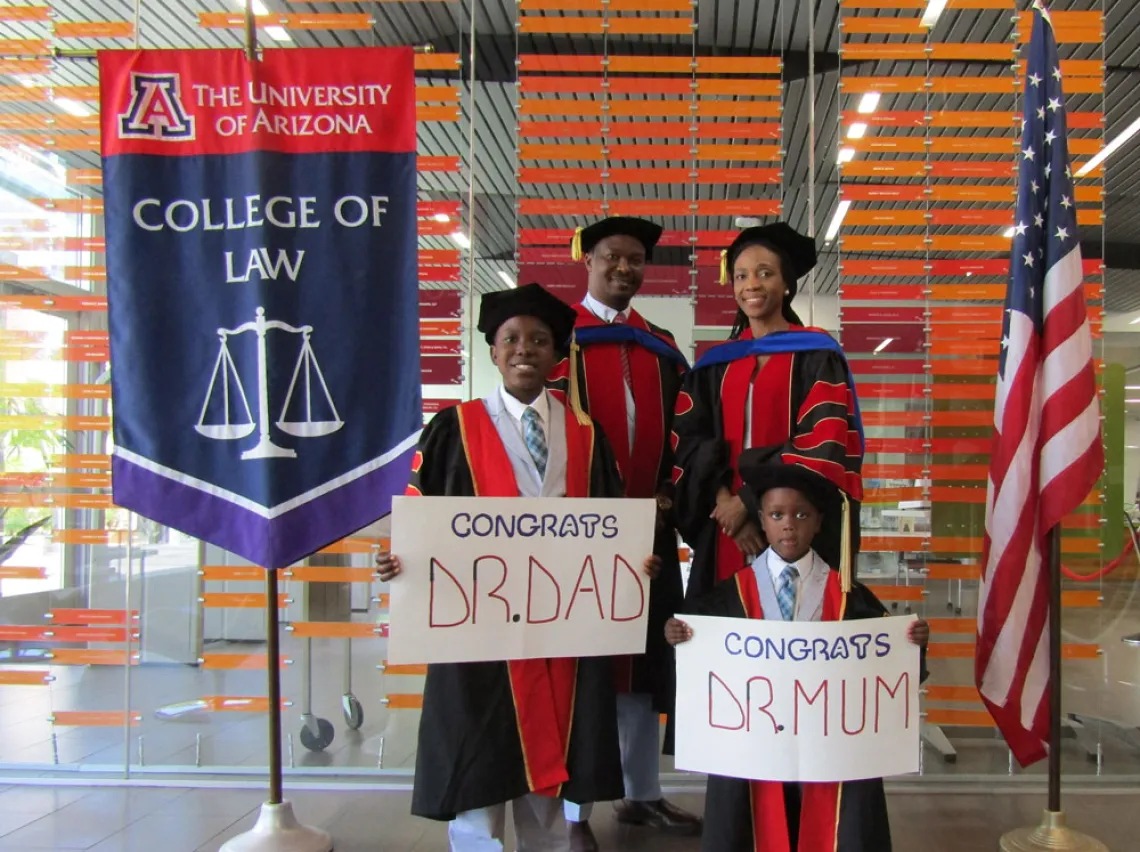Husband-and-Wife SJD Students Graduate Together
Benedict Maige Nchalla and Patricia Kisinda, SJD '21

For Benedict Maige Nchalla and Patricia Kisinda, studying at University of Arizona Law is a family matter. The husband-and-wife duo from Tanzania is graduating together this year from the Indigenous Peoples Law and Policy Doctor of Juridical Studies (SJD) program.
Maige Nchalla began the program first, and after visiting him in Tucson, Kisinda decided to join him, making the move from Tanzania and bringing along their two children, Gregory and Giovanni-Anthony.
“It was a great moment, a family union,” says Kisinda. “The saguaros warmly welcomed us, and we fell in love with the Sonoran Desert.”
Being in the SJD program together proved to be important for each individual’s success.
“Despite our demanding parental responsibilities, we were able to encourage each other in our studies and overcome many challenges, particularly those associated with the outbreak of COVID-19,” says Kisinda.
Kisinda, a senior resident magistrate at the Judiciary of Tanzania with extended jurisdiction, adjudicating certain offences under Tanzania High Court’s jurisdiction, joined the SJD program to advance her legal career and fill a gap in the courts.
“Tanzania experiences shortage of female jurists who have expertise in international human rights issues,” says Kisinda. “The major reason that made me want to pursue this degree was to be an expert of international human rights law, particularly on protection of children’s rights, and I found Arizona Law to be the proper place for that.”
Maige Nchalla’s focus was on international investment law and human rights. Prior to his time at Arizona Law, he was a lecturer and a dean of the faculty of law at Tumaini University Makumira in Arusha, Tanzania, a practicing attorney of the High Court of Tanzania, and listed legal counsel of the African Court on Human and Peoples’ Rights.
He hit the ground running upon arrival in Tucson, digging in with his classes and adjusting to the Socratic method.
“I really enjoyed the first year in residency of my program, especially Professor Rebecca Tsosie’s Federal Indian Law class, the [International Human Rights Advocacy Workshop] clinic under Professors Robert Williams and Seanna Howard, and Professor Sergio Puig’s International Investment Law and Arbitration class,” says Maige Nchalla.
Maige Nchalla says his time in the International Human Rights Advocacy Workshop gave him the opportunity to experience two hallmarks of and Arizona Law education: practical experience and working with a diverse group of students from different backgrounds.
Kisinda also says she most enjoyed the moments in law school when she was connecting with people from around the world, especially in her first year, when she was able to do so in person.
“This was the time when I met and got to know people from different parts of the world, sharing their intellectual experiences,” she says.
Other standout experiences for Kisinda include the Tribal Justice Clinic, the International Human Rights Advocacy Workshop, and a cherished visit to the Tohono O’odham Court and Museum.
“I was honored to speak with the Judges of Tohono O’odham Court and to see the historical background of the reservation as well as the culture of Tohono people,” she says.
After graduation, Maige Nchalla and Kisinda will return to Tanzania. Maige Nchalla will continue with his teaching career at Tumaini University Makumira and law practice and wants to establish a consultancy firm offering services on corporate social responsibility and responsible investment.
“I will impart the knowledge acquired in the program to ‘lawyers in the making’ and other stakeholders by introducing a course on business and human rights with a particular focus on indigenous peoples’ rights,” he says.
Kisinda will resume her duties in the Judiciary of Tanzania, now with added qualifications and expertise in children’s rights and gender equality.
“I anticipate protecting and interpreting the law to promote and protect female children’s welfare whenever exercising my judicial functions, but without being biased.” Kisinda says. “I will also inevitably be a resource in seminars and training programs on related matters conducted within the Judiciary of Tanzania and the entire legal fraternity.”
Maige Nchalla says they now have the tools to more effectively advocate for the causes they care about.
“I am proud of being part of the world-class SJD IPLP program,” he says. “The program has equipped me to engage in the fight for social justice, particularly indigenous peoples’ rights everywhere and anywhere.”
